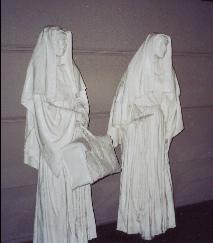 |
|
 |
|||||||
Outside of fundamentalist Muslim communities, people are pretty cool with the idea that humans invent laws. The structure and function of the US Supreme Court, the 55 mph speed limit, and the 21-year drinking age are incontrovertibly inventions of human lawmakers. The concepts of "legal" and "illegal" clearly exist as useful, nonarbitrary terms, even though what's legal in one place (say, prostitution, medical marijuana, or contraceptives) might not be legal in other places. Contrary to subjective human legal structures are moral laws. Morals are commonly seen as divine, or at least absolute, and therefore beyond human judgment. The speed limit is 55 or 65 or 35 because we say so, but murder is wrong because it really is wrong. That's the story, anyway. We can accept that it's up to us to make laws, but if genocide were only wrong because we said so, it wouldn't really, truly, actually be wrong, would it? When morals are defined as absolute, the term "subjective morality" must be a self-contradiction. Laws and morals meet in various ways. There's no controversy about enforcing some morals with the force of law, such as the injunction against murder. There's also little controversy about letting some moral transgressions slide, such as premarital sex. And there's an exciting middle ground where some citizens want to enforce morality with the force of law, others are willing to let private citizens make their own choices even if they're wrong, and others say that the supposed transgressions aren't immoral at all. For example, consider abortion. Should it be outlawed as an outrageous transgression? Should it be tolerated even though it's heinous because outlawing abortion leads to even more heinous consequences? Should it be tolerated even though it's wrong because people have the right to make private choices? Or should it be protected and supported as a means by which women can liberate themselves from biological destiny? One can ask similar questions about alcohol, medical marijuana, contraception, gay sex, and prostitution. But really, laws and morality aren't that different after all. It wasn't too long ago that people were encouraged to believe that kings and queens were put in place by God, and obeying them was a moral duty. Naturally, the kings and queens were quite keen on this idea. Thanks to the advance of humanism, we called the kings' bluff and now we take responsibility for our laws ourselves. Rulers once claimed God's backing, but now we say that the right to govern comes from consent of those governed. Morality is just in the same situation that laws were in centuries ago. Plenty of modern people still see morals as objective, ratified by a god, by nature, or by ultimate reality. But the transgressions that people are willing to consider as objectively wrong have been getting fewer and fewer. We're mostly down to acts of violence and theft as acts that we'll consider as contrary to objective morality. Eventually, we'll synch morality and law up again. Where we once saw them both as divinely ordained, we'll come to see them both as invented by human beings. —JoT Courts and Majorities: where laws and morals meet top |
|||||||
spooky statues at GenCon 03 |
|||||||